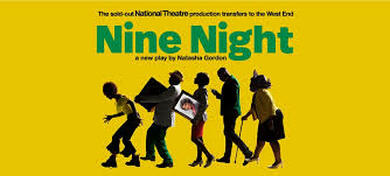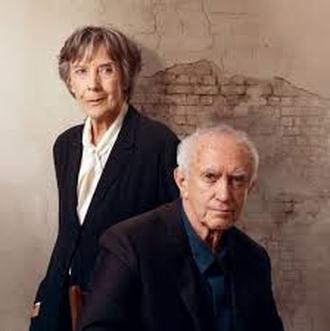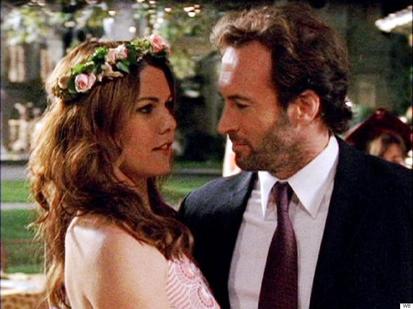 Nine Night at Trafalgar Studios: A Promising New Playwright’s Debutby Randi / January 24, 2019
Nine Night at Trafalgar Studios: A Promising New Playwright’s Debutby Randi / January 24, 2019At the end of 2018, I read that Letitia Wright was the most bankable star of the year, based on her appearance in two of the biggest blockbusters – Black Panther and Avengers: Yet Another – as well as Ready Player One. I thought wow, that’s a pretty big accomplishment for this what, teenager? what a lucky break for her. But it’s not luck (and she’s not a teenager, just blessed). Letitia Wright is a forking marvel (see what I did there) and deserves to bring in all the box office dollars, for screen or stage. As the star of the new play The Convert, Wright showed that she can do a lot more than turn all of modern science on its head and cure all injuries with alien metal and make cars that are being driven by a remote computer program or whatever, I can’t even wrap my head around what she did in Black Panther. What she did in The Convert, though, was prove that she has the ability to lead an intense stage work and to improve whatever she’s in with her dynamic presence.
Well that’s enough raving about the playwright and the star considering I thought this play, written in 2012, was just okay. I know, plot twist. The Convert takes place in 1895 in a village in Africa that is in the midst of being colonized by Bad White People. A young girl named Jekesai (Wright) escapes from an arranged marriage with the help of her aunt (Pamela Nomvete), who works for a prominent black man named Chilford (Paapa Essiedu). Whereas Jekesai and her aunt come from a family of the native tribal people, Chilford is much more westernized. He wears suits in the sweltering heat, compared to their less modest, more weather appropriate clothes. He speaks the Queen’s English (different queen then, if you can imagine) while they speak an African tongue. Most important, he has found Jesus, and he’s even a pastor of some sort, set on converting as many ‘savages’ as he can away from their pagan traditions. He agrees to let Jekesai stay in his house if she changes her name to Ester and begins on a serious journey towards Christianity. What starts off rather humorously (Wright’s first attempt at crossing herself is hysterical) and lighthearted (her aunt getting confused by which name to call her niece) turns serious and rather grim as Jekesai fully accepts a new life as Ester and takes her new religion to its extreme. In her acceptance, she scorns nearly all of her past life, including family and traditions, in the name of Jesus. It’s not funny anymore when she blesses herself; it’s upsetting, because you want to remind her that things are more important than blind faith. Things like family, or a semblance of reason.
While Ester is becoming a superfriend to Big J and trying to convert her fair share of villagers, the native people are getting less and less pleased with the white colonizers taking over things. We hear of more and more problems between the groups, growing in severity and breadth. The angry villagers are no longer just targeting white people; they’re targeting black people who get too close, or act too much like, the white people. People like Chilford, and his friend Chancellor (these names) and his fiancée Prudence, similarly westernized but less tight with Jesus, at least in Chancellor’s case (he’s a bad man). Chancy, as they call him, wants a piece of Ester, and he doesn’t understand what she means by no, or what Jesus says about cheating on your fiancee. One problem I had with this show is that we’re supposed to feel something, probably, about what befalls Chancy, but I was like, okay, justice served.
So about that. Ester’s place in the middle of two worlds begins to take a toll on her, reaching its climax when her uncle and cousin, big on the whole ‘kill whoever is white or acting white’ thing, break into Chilford’s home when she is there with Chancy. The encounter escalates into violence, whether accidental or not, and Ester’s deciding whether to protect her relatives or not in the face of the law builds in a way you can’t see coming.
Although the story is interesting, I didn’t get enough about the why of it all, why the characters were acting like this, why Ester would so fully commit to her conversion and take it beyond what was expected and then why she would react so terribly to the climactic events. I didn’t get enough of why Prudence would go so quickly from wanting to kill Ester’s cousin to agreeing to advocate for him. Her change literally happens in the span of 2-3 lines, and there’s no real reason shoring up her behavior unless it’s simply that allegiance to your people and the need to fight together against your oppressors should overcome everything else, even love and justice. I mean it sounds right, difficult but right, but her change of heart happened so unexpectedly that it took me out of the play’s universe for a minute.
I also expected some slight recognition that the church maybe wasn’t the answer to everything. Ester’s actions at the end were shocking and awful, but the awfulness of them seemed to be brushed aside with her request for forgiveness from Jesus and from her spiritual leader, Chilford. I get that forgiveness is like Real Big in Christianity but I don’t think it should just be given away as a matter of procedure. It should be earned or deserved. And maybe in this situation, there’s nothing to be gained from having Chilford hold out on doling it out when it’s not his to give, and when it’s not deserved. However, the impression that she actually was forgiven bothered me. I guess Jesus will have the last say and everything but I really wanted to look around at the audience and just reassure myself by getting everyone to agree that what she did was wrong, right, y’all know that was wrong? I just wanted to be sure.
Apart from my feeling that there was a lack of apparent motivations, overall it was a compelling look into identity amid adversity and trauma. I’m still thinking about how I feel about certain aspects of it, which is the sign of a successful work. And despite my qualms, it’s definitely a worthwhile show, especially this production. The acting was mostly great, and I really liked how they made use of the in-the-round setting. It added tension to be so close to this distress, and it made everything more urgent and wrenching, adding layers of emotion to this show. Most of all, it was a showcase for Wright, who is a welcome addition to the London stage and will surely be considered one of the greats of her generation in no time.










